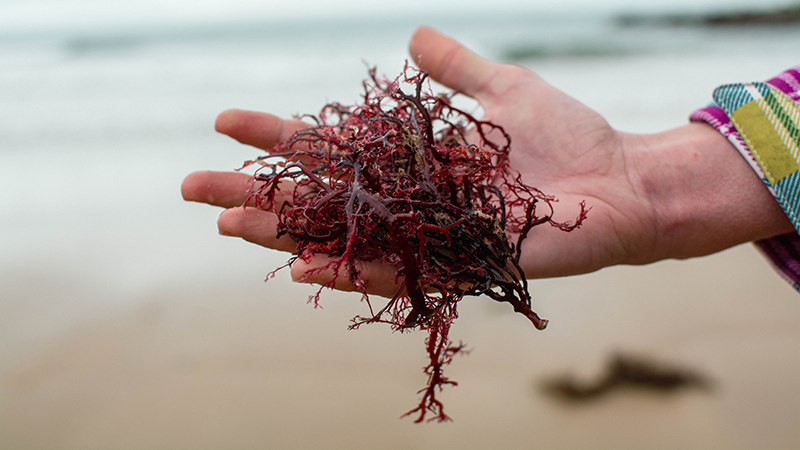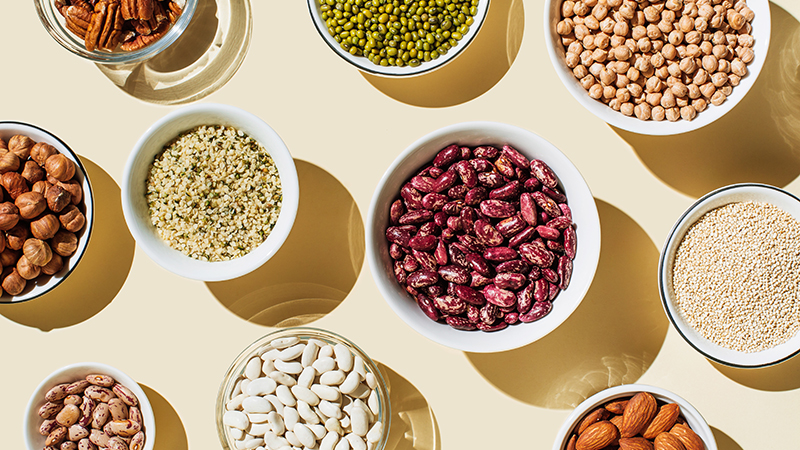Eat Your Beets: Why They Belong in Your Diet
How This Vibrant Root Vegetable Helps Your Health
Updated December 2025
Beets aren’t just trending — they’re a nutrient powerhouse packed with benefits for your heart, brain and liver. This brightly colored root vegetable has a sweet, earthy taste and its vibrance makes any dish pop. But beyond their beauty, beets deliver impressive health benefits.
Beets have more iron than spinach.— Sandra Hunter, RD
What Makes Beets Good for You?
Beets are low in calories and fat and have no cholesterol. Beetroot has more natural sugar than other vegetables — about 6 to 9 grams per cup. However, its high fiber content slows down sugar absorption, which keeps blood sugar levels balanced.
The glycemic index for beets is moderate, which means they are typically OK for people with Type 2 diabetes to eat in moderation. The glycemic index ranks a food’s carbohydrates on a scale from 0 to 100 based on the amount it raises blood sugar.
“Beets are an excellent choice if you’re seeking a nutrient-dense, flavorful food,” says Sandra Hunter, RD, a clinical nutrition manager at Northwestern Medicine.
Beets are packed with nutrients that support a healthy diet, including:
- Folate: helps with cell growth and supports heart health
- Potassium: helps regulate blood pressure
- Magnesium: supports muscle and nerve function
- Fiber: improves digestion and helps manage Type 2 diabetes
“Beets also contain phosphorous, iron, beta-carotene, and vitamins A, B and C,” says Hunter. “They have more iron than spinach. Plus, their leafy green tops are rich in antioxidants and anti-inflammatory properties and can be sautéed or added to soups and salads.”
Studies link beets to improved:
- Blood pressure
- Circulation
- Athletic performance
- Cognitive function
- Liver function
Health Benefits of Beets: Heart, Brain and Liver
Heart
Research suggests that beets are especially good for your heart. They contain nitrates, which your body turns into nitric oxide. This helps relax and widen blood vessels, increasing blood flow and lowering high blood pressure. This can help reduce the risk of heart disease and stroke.
“Beets also have a high concentration of phytosterols. These are natural compounds found in plants that can help lower cholesterol,” says Hunter.
Brain
The nitrates in beets help improve blood flow to the frontal lobe in the brain. This is the part of the brain responsible for memory and decision-making.
“As we age, nitric oxide production in the body decreases, which contributes to the aging process,” says Hunter. “Less blood flow to the brain can contribute to cognitive impairment, reduced processing speed and dementia. When combined with exercise, nitrates from beetroot juice can support brain health by increasing blood flow to the brain during cognitive tasks.”
Liver
Beets are also liver-friendly powerhouses. They contain betaine and betalains (including betanin and vulgaxanthin), which are plant-based pigments packed with antioxidants.
Betanin gives beets their vibrant red color. But it’s water-soluble and heat-sensitive, so prolonged cooking can destroy it. This compound helps protect the liver by reducing oxidative stress and inflammation. Oxidative stress happens when free radicals overwhelm the body’s defenses, damaging cells, including liver cells.
Betaine — a nutrient made from choline (a B-complex vitamin) — goes a step further. It aids in natural liver detoxification and protects liver cells from damage. It also helps the liver process fats efficiently, preventing fatty deposits that can lead to liver disease.
Do Beets Help Improve Athletic Performance?
Studies show that beetroot juice and beetroot extract can improve stamina and endurance in athletic performance. Athletes sometimes drink beet juice before workouts to boost oxygen delivery to muscles to perform better and recover faster.
“Positive results from supplementing with beetroot juice are mostly seen in high-intensity exercise like running and cycling,” says Hunter.
Are Beet Supplements Effective?
Although beetroot extract and powders can be helpful for athletes, whole beets have more fiber and a wider range of nutrients. Supplements may lack some of the benefits found in fresh beets. Juices lose fiber, which supports gut and digestive health.
“Get the nutrients from the food instead,” says Hunter.
How Many Beets Should You Eat?
Hunter recommends eating 1 cup of cooked beets or a half cup of beetroot juice per day to get the benefits. Start small and see how your body responds.
1 cup of beets provides:
- 75 calories
- 3 grams of protein
- 17 grams of carbohydrates
- 3 grams of fiber
- Less than 1 gram of fat
Are There Risks to Eating Beets?
Eating beets regularly is OK for most people. However, some people may experience:
- Beeturia (red or pink urine or stool that is harmless but surprising) due to a phytonutrient in beets that cannot be metabolized in the body
- Increased risk of kidney stones due to oxalates, which are natural compounds that can bind with minerals like calcium in the body to form kidney stones
- Gout flare-ups in people sensitive to purines, which can be broken down into uric acid
- Digestive upset if eaten in large amounts
- Medication interactions caused by the nitrates in beets, which may enhance the effects of certain medications, such as blood pressure medications, and cause very low blood pressure
If you have concerns, talk to your physician before eating beets.
How to Eat and Cook Beets
To preserve their nutrients:
- Eat raw or lightly steamed (less than 15 minutes).
- Roast with olive oil for flavor and nutrition.
- Avoid boiling for long periods.
“Steaming, roasting and grilling beets are the recommended cooking methods since they retain nutrients. Cook beets quickly and use a minimal amount of water to prevent nutrient loss,” says Hunter. “You can keep the skin on or add lemon juice to preserve antioxidants.”
Beets are used in a variety of dishes:
- Soups
- Salads
- Side dishes
- Snacks like beet chips
- Desserts (recipe below!)
But raw beets are edible, too. “They contain more vitamins, minerals and antioxidants than cooked beets,” she says.
How to Add Beets to Your Diet: 2 Beet Recipes
Beet brownies
Ingredients
For the beet puree, you’ll need:
1 can low-sodium sliced or diced beets
1/4 cup buttermilk
For the brownies, you’ll need:
1/4 cup olive oil
1 1/4 cups sugar
3/4 cups unsweetened cocoa powder
1/4 teaspoon salt
1/2 teaspoon baking powder
2 teaspoons vanilla extract
2 large eggs
3/4 cups flour (can use a mix of white and whole wheat)
1 cup beet puree
1/2 cup dark chocolate chips
Instructions
- Preheat oven to 325 degrees Fahrenheit. Spray cooking spray on an 8-by-8-inch pan lined with foil.
- Make beet puree: Blend beets and buttermilk until smooth.
- Mix remaining ingredients, including 1 cup of the puree.
- Bake 25 to 35 minutes until top is no longer wet.
- If you have extra puree, use it in smoothies, soups or pancake batter.
Beet salad with mustard vinaigrette
Ingredients
For the primary ingredients, you’ll need:
1 pound peeled, diced beets
1 tablespoon olive oil
Vinaigrette
1 teaspoon Dijon mustard
1 tablespoon red wine vinegar
1 tablespoon minced onion
2 tablespoons olive oil
Toppings
2 tablespoons chopped pistachios
2 tablespoons goat cheese
Instructions
- Place beets on a sheet pan with a silicone liner or use foil to line the tray.
- Drizzle 1 tablespoon of olive oil over beets.
- Roast at 400 degrees Fahrenheit for 20 to 30 minutes.
- Mix vinaigrette ingredients and pour over beets.
- Top with pistachios and goat cheese.
- This salad can be served warm or chilled.
Foods That Pair Well With Beets
To enhance the health benefits of beets, pair them with:
- Leafy greens like spinach and arugula
- Nuts and seeds like walnuts and pistachios
- Citrus fruits like oranges and lemons
- Whole grains like quinoa and farro
- Healthy fats like avocado and olive oil
Why Beets Belong in Your Diet
Eating beets can do more than brighten your plate — it can support heart, brain and liver health. Whether you enjoy them roasted, raw or juiced, adding beets to your meals is a simple way to boost your overall health. Start small and reap the benefits of this vibrant root vegetable.





